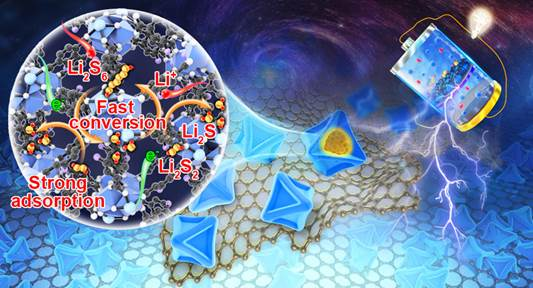我室陈嘉嘉教授在 ACS nano 上发表论文:Defects Engineering of Lightweight Metal–Organic Frameworks-Based Electrocatalytic Membrane for High-Loading Lithium–Sulfur Batteries
摘要:The sluggish kinetics and shuttle effect of lithium polysulfide intermediates are the major issues that retard the practical applications of lithium–sulfur (Li–S) batteries. Herein, we introduce a defect engineering strategy to construct a defected-UiO-66-NH2-4/graphene electrocatalytic membrane (D-UiO-66-NH2-4/G EM) which could accelerate the conversion of lithium polysulfides in high sulfur loadings and low electrolyte/sulfur (E/S) ratio Li–S batteries. Metal–organic frameworks (UiO-66-NH2) can be directionally chemical engraved to form concave octahedra with abundant defects. According to electrocatalytic kinetics and DFT calculations studies, the D-UiO-66-NH2-4 architecture effectively provides ample sites to capture polysulfides via strong chemical affinity and effectively delivers electrocatalytic activity of polysulfide conversion. As a result, a Li–S battery with such an electrocatalytic membrane delivers a high capacity of 12.3 mAh cm–2 (1013 mAh g–1) at a sulfur loading up to 12.2 mg·S cm–2 under a lean electrolyte condition (E/S = 5 μL mg–1-sulfur) at 2.1 mA cm–2 (0.1 C). Moreover, a prototype soft package battery also exhibits excellent cycling stability with a maintained capacity of 996 mAh g–1 upon 100 cycles.

文章链接:https://pubs.acs.org/doi/10.1021/acsnano.1c05585